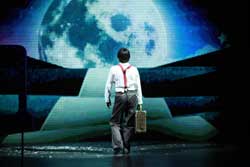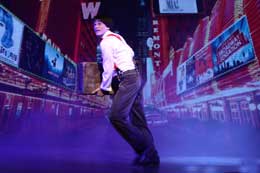AVIVA-Berlin >
Interviews
AVIVA-BERLIN.de im Februar 2026 -
Beitrag vom 16.01.2012

Zum ersten Mal in Berlin - Hanoch Rosenn mit seiner Show Speechless
Meyer, Vartanian, Adler
Eine magische Welt in 3D wird vom 09. Februar bis 04. MûÊrz 2012 im TIPI am Kanzleramt zu erleben sein. Im Interview mit AVIVA verrûÊt der in London geborene, im Alter von vier Monaten nach Israel ...
... immigrierte Pantomime seine Philosophie.
Seine aktuelle Show "Speechless" kreierte der international renommierte Ausnahmekû¥nstler Hanoch Rosenn 2009 eigens fû¥r das israelische "Festival of Arts". In die Inszenierung lûÊsst er seine vielfûÊltigen Erfahrungen als Regisseur einflieûen: digitale Techniken, theatrale Elemente, bewegende Pantomime, LED-Bildschirme und 3D-Animationen schaffen einzigartige Welten und berû¥hren ganz ohne Worte. "Speechless" gewann den "Preis fû¥r die Beste Show" in Israel und wurde unter anderem in Costa Rica, Kolumbien, Peru, Chile, Kroatien, Mexiko und Frankreich aufgefû¥hrt.
|  |
ôˋ Menachem Oz |
AVIVA-Berlin: You have been doing pantomime since you were a teenager and you learned from the best teachers in the world. For instance, in Paris with Etienne Le Crux, Marcel MarceauôÇs pantomime teacher as well as Ella Jarozchewich. Now today you are one of the most popular mime artists yourself.
How would you say your style of work has changed over the years?
Hanoch Rosenn: Etienne Le Crux was an artist and a philosopher. Behind his teaching were many ideas about human life. Indeed he developed the art of mime as we know it today - the beautiful art of creating illusions with your body alone, to create a location and a story without using a set or any words.
His amazing inventions were spread in the world thanks to his talented pupil Marcel Marceau, who had an amazing talent and a very strong stage personality.
I knew that I wanted to do something from that art when I saw the amazing mime Samy Molcho. I was 15.5 years old then, and that performance of Molcho inspired me.
Today if we see mime as they have created it, we might feel that it is slightly "old fashioned" perhaps from another world. The audience might look for some originality. We need to find new and exciting ways to be Uup-to-date - use the technology and still touch the heart! Like those masters did.
AVIVA-Berlin: What striking memories do you have from meeting Etienne Le Crux and Ella Jarozchewich and learning with them?
Hanoch Rosenn: Mr Le Crux used to give lectures every Friday noon at the end of the week. Everyone would "drink" his words and demonstrations. Then Mr Le Crux would say goodbye to each student. He would shake the hands of the guys, and kiss the girls - it was in France so it was a "French kiss", and he was 82 years old!
Ella Jarozchewich was a dancer - so in her lessons you would sweep!
AVIVA-Berlin: Do you think that being a mime artist changed your personal relationship to verbal language? Did you choose the art of mime because of personal reasons, do you have a special connection to verbal or non-verbal language?
Hanoch Rosenn: I have got a gift. It is like a pianist who can play, a painter that can paint. I have the gift to express myself with no words - I want to share it with the audience. To make people laugh, think, feel, perhaps even cry...
The audience usually identifies with the ideas and feelings. They know what I am "speaking" about - because my journey in the show through life is the journey of each and every one of us - of the human kind.
The audience usually goes out in the end of the show with a smiling heart! And thatôÇs why I chose this art form.
AVIVA-Berlin: In 2009 you created your new show "Speechless", especially made for the Israeli Festival of the Arts. Since then, it has been performed worldwide. In 2012 it will be also performed on Broadway, New York and very soon in the TIPI, Berlin. Could you please tell us about the main themes of "Speechless"?
Hanoch Rosenn: I donôÇt say words in the show ã but I tell a storyãÎ about a man and his journey in the world.
It is the story of us all, things we know from our life, moments we recognize, thoughts we identify with, feelings we are familiar with - this is the story of a man in the 21st century, trying to keep the rhythm in life, trying to cope with its demands and challenge. All those moments of life are described in motion, in a physical language, full of body movementôÇs, facial expressions, dance, theatre, mime and all integrated with up-to-date stage technology of visuals.
But really the main idea is to make the audience laugh, think, smile, cry, and feel, without saying to them one word.
AVIVA-Berlin: In your new project, "Speechless", you use very important special effects such as L.E.D. screens and 3D technology. How and why did you create those special effects? Do you work with a visual designer or with various visual artists?
Hanoch Rosenn: The "Facebook-Generation" grew up with a computer... it is a part of their life. They are used to the graphics and the quick global communication. They played more computer-games in their childhood than games "outside" in their neighborhoodãÎ So to catch their attention and to communicate with them is to use their language - computers, graphic design, 3D animation. This I do with a large group of designers ã led by few masters of computer designers.
I tried to find a way to use the L.E.D. as a background that has a role in the show, to make the audience amazed by them, but still to leave space for the audience imagination.
I hope that I have found the way to integrate with the visual technology in such a way that still the heart is the main issue, the main theme of the show (and "the Facebook-Generation" has a big heart - you just need to find it...). The ideas and messages, the feelings that I want to express and bring to the audience - they are the most important - and they are delivered through and together with the technology.
AVIVA-Berlin: What are the biggest challenges of using such a variety of new technologies?
Hanoch Rosenn: To reach the "Facebook-Generation", I had to find the right balance between the art of technology and the pure art of theatre. To have the screens and 3D animation as "partners" for me in the show and not as "enemies" who are fighting for the attention of the audience.
AVIVA-Berlin: Do you sometimes attend the shows of other contemporary mime artists, for example James Thiûˋrrûˋ, the grandson of Charlie Chaplin? How would you say you connect with him or others? How do they inspire you?
Hanoch Rosenn: I try to see as much as I can. Live on stage, in film, TV or Internet. Mr Thiûˋrrûˋ is an amazing visual artist. I have only watched a video of his work and am looking forward to see him on stage.
There are still few (not many...) great visual artists - and it is always an exciting moment for me to discover or to watch the work of such an artist.
AVIVA-Berlin: Which performers (dancers, actors) do you like? Do you feel you belong to a family of artists?
Hanoch Rosenn: There are some very strong visual shows in the world. Blue Man Group, Fuerza Bruta, Stomp, Cirque du Soleil, SlavaôÇs SnowShow and more. It is interesting to know that lately some Visual shows from Israel are touring the world as well, with much success: The Voca People, Mayumana, The Aluminum Show, Shakatack, ãÎSpeechless.
And that makes me happy and proud. We are a small country but probably very creative...
AVIVA-Berlin: Do you think that mime, as an art form, is entering a period of revival?
Hanoch Rosenn: Perhaps it is the visual theatre that has this revival.
The world is more and more like a small village. Everything moves fast from one country to the other - no language barriars.
So the use of international language of visual theatre, is getting more and more popular.
I direct big shows with acrobats, dancers, actors, special effects, flying, water, fire, much use of film and screening, videos and L.E.D. screens, so it was very natural for me to find myself bringing "the spectacular" elements to the art of mime.
And it seems that it gives art a sense of revival. I am sure that every artist finds his own way to revival through the art he loves.
AVIVA-Berlin: Could you tell us something about your family origins? Were there any artists or performers in your family? Does your family background influence your work today. For instance, in the themes you develop on stage?
Hanoch Rosenn: My father was born in Vienna, he was an interpreter ã and spoke many languages, he was very talented - he knew a lot and spoke a lot. Perhaps this is one of the reasons why I decided to be SPEECHLESS...
My mother was born in Israel and was working in the education office. She wrote books, for teaching as well as stories and poems. She came from a very religious family ã her father was a rabbi! A head of the "Goor community of hassidim". I am named after him ã Hanoch.
AVIVA-Berlin: Some israeli artists, like Idan Raichel, perform worldwide with the idea of bringing the Israeli culture into international pop music. Do you think that in their own way your creations also contain a bit of Israeli culture? Or as an artist, do you feel more like a world citizen?
Hanoch Rosenn: The art that I do is very international. Also the messages and ideas, but I am sure that something from my "Israeli" background does come out in the show.
I would like to see myself as an ambassador with no words of Israel.
|  |
ôˋ Menachem Oz |
AVIVA-Berlin: Besides performing your one-man-shows, you have also worked as a stage director for a long time.
What special aspects of each of these two types of work do you like most?
Hanoch Rosenn: There are two sides to my art form: the one as a director requires the ability to work with many creators, actors, dancers singers, many special effects, and set and songs and speaking. The other as a performer, in a much more minimalistic way that requires more depth. I try to bring the glamour and "show extravaganza" from my directing experience, and put it into my own shows that are like "small spectacles" with a lot of heart.
AVIVA-Berlin: You said in an interview that happiness was a very important thing for you: you love to make your public happy. You, yourself, are very happy when doing your work and performing. Is happiness a natural talent for you, or is it something you grew into, while developing your art - the mime?
Hanoch Rosenn: There are some delicate moments in the show that you can feel - there is no dry eye in the theatre.
So I do have more sides in meãÎ
But yes, mainly I am a happy person and this optimism is found in the show. Most of the time the audience is laughingãÎ I am sure that the happiness in my life grew ã when I have found my destiny, but that was in such a young age (15) I can hardly remember what kind of a boy was I before that, but almost sure I was happy then as well. Perhaps I am a "happy person - mixed with sensitive feelings".
AVIVA-Berlin: Thank you very much! We are looking forward to meet you in Berlin and to see you on stage!
Best, Aurûˋlia, Britta, Sharon
Hanoch Rosenn: Thank you for your beautiful and interesting questions!
Yours, Hanoch
Hanoch Rosenn
Speechless09. Februar bis 04. MûÊrz 2012
TIPI am Kanzleramt
Di ã Sa 20.00 Uhr, So 19.00 Uhr
Karten-Telefon 030-390 665 50 oder
karten@tipi-am-kanzleramt.deKarten inkl. aller Gebû¥hren: VVK Euro 19,50 ã 34,50 Abendkasse Euro 16,60 ã 29,30, StudentInnenkarten an der Abendkasse: Euro 12,50
www.tipi-das-zelt.deWeitere Infos zu Hanoch Rosenn unter:www.tamirshow.comwww.youtube.com